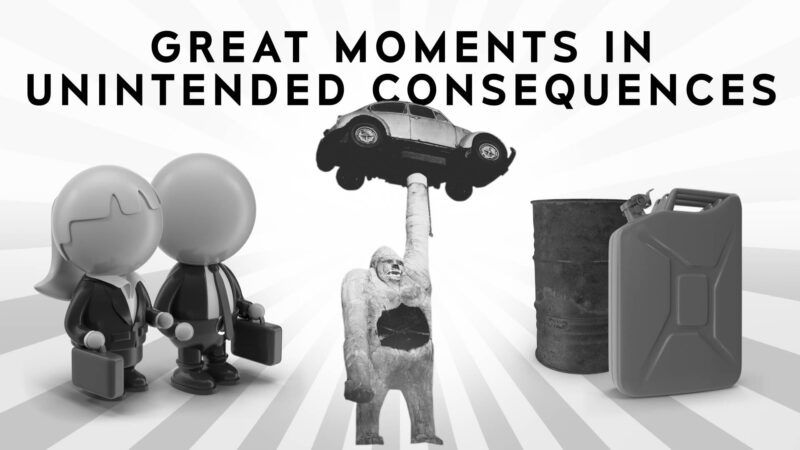Great Moments in Unintended Consequences: Black Liquor Fuel, Billboard Bans, Gender Pay Gap (Vol. 4)
Good intentions, bad results.

Even more of Reason's "great moments in unintended consequences"—stories of when something that sounds like a terrific idea goes horribly wrong.
Watch the whole series.
Black Liquor Bonanza
The Year: 2005
The Problem: Fossil fuel consumption is too high, and biodiesel consumption is too low!
The Solution: Create a generous tax credit for companies that blend fossil fuel with environmentally friendly biofuel.
Sounds like a great idea with the best of intentions. What could possibly go wrong?
Turns out paper companies were already using a pure biofuel known as black liquor, which is produced during the paper-making process. It's a super convenient energy source to use in paper plants and mills, but only blended fuels were eligible for the tax credit.
So paper companies bought fossil fuel they didn't need, added it to the biofuel they were already using, and instantly qualified for very generous "blended alternative fuel" credits. Exactly the opposite of the tax credits' intent, but sometimes it all boils down to paper.
Billboard Bans
The year: 1968
The Problem: Billboards are cluttering the scenic vistas of Vermont.
The Solution: Ban Billboards.
Sounds like a great idea with the best of intentions. What could possibly go wrong?
As the billboards came down, something new popped up: a 12-foot gorilla holding up a Volkswagen. A giant squirrel in a striped bathing suit. A 19-foot genie holding a carpet.
"A veritable zoo of Gargantuan concrete sculpture" all in the name of public art.
It all seems a bit cute until a development dispute with the local bureaucracy results in a 700-pound middle finger on a 16-foot pole.
Enjoy the view, Vermont!
Equal Pay in Colorado
The Year: 2019
The Problem: the gender pay gap.
The Solution: the Colorado Equal Pay for Equal Work Act—a bevy of new regulations on employers, including a requirement that all forms of compensation be disclosed as part of every job listing, and a ban on asking job candidates about their salary history.
Sounds like a great idea with the best of intentions. What could possibly go wrong?
Not only does the law open up companies to new legal liabilities and administrative burdens, but it also hinders employer flexibility when it comes to hiring. As a result, some companies like Samsung, Century 21, Cigna, IBM, Nike, and even People for the Ethical Treatment of Animals (PETA) have simply excluded Colorado from their remote job listings.
Can't have a pay gap if you don't have a paycheck! Mission accomplished, Colorado!
Written and produced by Meredith and Austin Bragg; narrated by Austin Bragg
